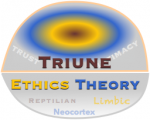
Trust and the Triune Ethics Theory reviews Darcia Narvaez’s breakthrough Triune Ethics Theory paper and draws new insights into how trust and relationship building work, based on the human brain’s evolutionary development, structure, and functions. And it sheds light on how experiential social media increases intimacy.
Triune Ethics Theory, Darcia Narvaez, Ph.D.
 Triune Ethics is an enthralling, exceedingly useful approach to understanding human behavior because it explains the context of trust and relationship building at a profound level that is actionable for anyone who wants deeper, richer, more flexible connections and collaboration with people. Triune Ethics Theory will help me to educate my clients and teams at a deep level, and it can give you a rare understanding of your own behavior—and that of people around you. Triune Ethics is an enthralling, exceedingly useful approach to understanding human behavior because it explains the context of trust and relationship building at a profound level that is actionable for anyone who wants deeper, richer, more flexible connections and collaboration with people. Triune Ethics Theory will help me to educate my clients and teams at a deep level, and it can give you a rare understanding of your own behavior—and that of people around you.
As with all my reviews, I will attempt to summarize this paper’s salient points before adding some reflections and conclusions about how I’m using its assertions in my work. As I have no formal training in neuroscience, I am drawing on lay study as well as psychology and my […]
 The Potential of Female Leadership explores what lessons we may learn from bonobos’ matriarchal social structure, so we can build stronger, more collaborative human communities and groups. Bonobo Handshake is an enthralling insightful book, which I review here. A tremendous bonus is its similarities to and significant differences from Chimpanzee Politics (reviewed yesterday). The Potential of Female Leadership explores what lessons we may learn from bonobos’ matriarchal social structure, so we can build stronger, more collaborative human communities and groups. Bonobo Handshake is an enthralling insightful book, which I review here. A tremendous bonus is its similarities to and significant differences from Chimpanzee Politics (reviewed yesterday).
Bonobo Handshake was on the same library shelf as Chimpanzee Politics, but it is a very different book, and in delightful ways. At the same time, it offers intriguing insight into bonobos’ behavior, which differs significantly from chimpanzees’ and holds interesting lessons for human societies and groups. Although Woods is not a primatologist per se, she has conducted extensive research with her husband, who is, so explaining scientific experiments forms a key part of this book.
Bonobo Handshake is rare in a surprising way. Deftly and subtly, it contrasts the joy, harmony and matriarchal structure of the bonobos with chimpanzees’ and humans’ patriarchal societies and violence: the wars in and around the two Congos result in the […]
 Unique, Insightful and Useful Guide to Business and Civil Politics reveals human political strategies through the eyes of a primatologist studying a chimpanzee community. It lays bare most of the behavior people use “to get ahead” in business and politics by explaining the evolutionary underpinnings of these behaviors, so we can appreciate them at a new level. Unique, Insightful and Useful Guide to Business and Civil Politics reveals human political strategies through the eyes of a primatologist studying a chimpanzee community. It lays bare most of the behavior people use “to get ahead” in business and politics by explaining the evolutionary underpinnings of these behaviors, so we can appreciate them at a new level.
Have you ever heard someone say, “I’m not political!”? S/He may mean well, but this book shows that one cannot be human without being “political”; moreover, it explains political behavior in hilarious, poignant ways that help the reader in multiple ways as I detail here. It is immensely entertaining to read while being scientific in its assertions.
[…]
 11 Celebration summarizes my reflections on CSRA’s first decade in business, and my vision for our next decade. We’ve been pioneering in experiential social media and social business transformation since I founded the firm in February 2006. 11 Celebration summarizes my reflections on CSRA’s first decade in business, and my vision for our next decade. We’ve been pioneering in experiential social media and social business transformation since I founded the firm in February 2006.
It’s difficult to encapsulate ten years of learnings, but that hasn’t stopped me from trying! This page will reprise some of my favorite posts, and it will feature a series of videos I’ve made in which I explain where we’ve been and where we’re going. This post will change frequently, so please consider it a work in progress.
[…]
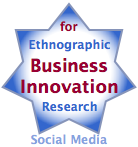 Ethnographic research for business innovation shows how to apply ethnographic research of social media to managing controlled disruption within organizations. Ethnographic research of social media can transform the entire innovation process because it’s a very efficient way to study the behavior and motivations of the people that the innovation proposes to serve. Unlike traditional innovation and ethnographic research methods, which are relatively slow, costly and qualitative, ethnographic research of social media combines qualitative richness with quantitative analysis. It’s faster and less costly, too. Ethnographic research for business innovation shows how to apply ethnographic research of social media to managing controlled disruption within organizations. Ethnographic research of social media can transform the entire innovation process because it’s a very efficient way to study the behavior and motivations of the people that the innovation proposes to serve. Unlike traditional innovation and ethnographic research methods, which are relatively slow, costly and qualitative, ethnographic research of social media combines qualitative richness with quantitative analysis. It’s faster and less costly, too.
Ethnographic research for business innovation can dramatically improve the depth and breadth of business and corporate strategy, business design and service design research since it allows teams to consider more users and to assess their behavior and motivations, which can improve the value of more costly research.
This post outlines the business innovation use case of ethnographic research of social media, and it includes examples in banking, professional services, consumer products, and B2B marketing. For more on ethnographic research, see More Resources below.
[…]
Social media strategy good practices is a short list of principles that can make your firm stand out when empowering customer and employee experience. It’s part of a talk I gave today to a large multidisciplinary team. Their venerable institution plans to use social media strategy to get the ducks in a row without too much squawking. The most exciting aspect of social media strategy is that there’s so much room for improvement: while your peers and competitors are trying to “engage” with finely crafted-yet-impersonal content, you can power past them using experiential social media, which focuses on scalable interaction.
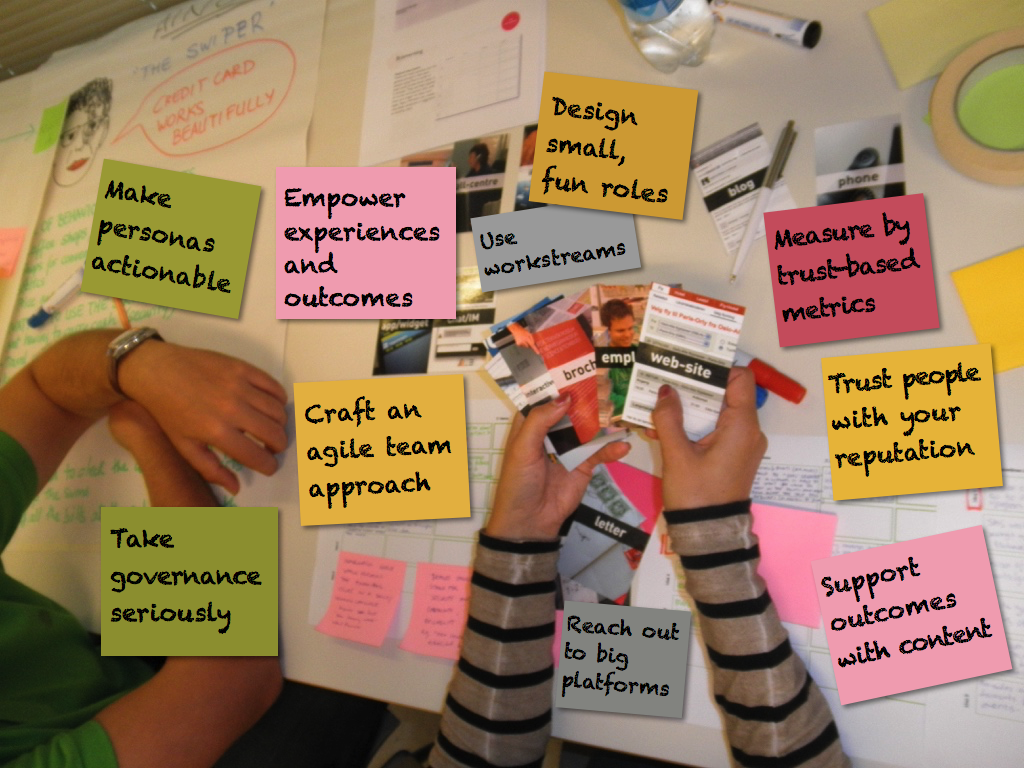
Here are the cliff notes to the good practices part of our discussion:
[…]
Using Social Media and Social Business Together to Evolve Experience reveals differences between “the two socials,” and its startling conclusion is that most businesses will benefit from keeping them separate but related during the next three years.
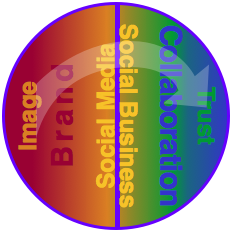 [Updated] There’s a much deeper context that makes the two socials vital: many of the assumptions on which business is built are being completely disrupted. For only one example, as Chief Marketer myself, I used to follow the mantra, “We always want to show our brand in the most positive light” (even when we’re lackluster). That impulse is increasingly risky. Take a few minutes and reflect on how profound that change is. Entire marketing and public relations industries are built on it, and it is very risky because people reveal the obfuscation and half-truths that used to work. There is no such thing as a “half” truth. [Updated] There’s a much deeper context that makes the two socials vital: many of the assumptions on which business is built are being completely disrupted. For only one example, as Chief Marketer myself, I used to follow the mantra, “We always want to show our brand in the most positive light” (even when we’re lackluster). That impulse is increasingly risky. Take a few minutes and reflect on how profound that change is. Entire marketing and public relations industries are built on it, and it is very risky because people reveal the obfuscation and half-truths that used to work. There is no such thing as a “half” truth.
From a practical standpoint, organizations need to manage their way through the transition to pervasive transparency, pacing their evolution with changing stakeholder expectations. This is where social media and social […]
 The rise of design signaled the fall of Nokia, RIM and Motorola describes how engineering is becoming less important in distinguishing hightech and other products from each other. It also presages a seismic shift away from product towards customer experience in determining market leaders for people-oriented products and services. A very large portion of product companies will follow in the footsteps of these three former mobile phone titans unless they transform their focus from product features (engineering) to customer experience (design). The rise of design signaled the fall of Nokia, RIM and Motorola describes how engineering is becoming less important in distinguishing hightech and other products from each other. It also presages a seismic shift away from product towards customer experience in determining market leaders for people-oriented products and services. A very large portion of product companies will follow in the footsteps of these three former mobile phone titans unless they transform their focus from product features (engineering) to customer experience (design).
By no means do I imply that engineering is not important—in fact, it is more important than ever—I assert that it is less important than design in differentiating people-oriented products. Engineering is abstracted away from the customer/user of the product, and design explicitly addresses how the customer uses the product to attain outcome(s).
Design is to the Knowledge Economy what engineering was to the Industrial Economy.
[…]
7 Social Business Transformation Tools provides digital executives the vital tools of online engagement, from the Social Business Life Cycle and Social Business Strategy Use Cases to the report that ranks social business advisory firms in their ability to help firms transform.
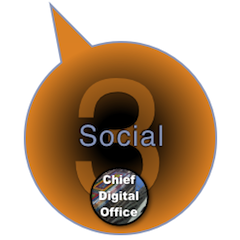
7 Social Business Transformation Tools is Part3 of the CDO Guide to Social Business for Transformation. The tools it describes encapsulate thousands of hours of hands-on experience with strategy and in-the-trenches execution work with global brands, and they explicitly address the ins and outs of people, process and technology. Part3 includes links to tools’ full versions, so CDOs can use it as a dashboard.
The Guide to Social Business for Digital Transformation helps Chief Digital Officers to understand and act on rapidly improving stakeholder relationships, productivity and business performance. The Social Business Competency Center has even more resources. The Chief Digital Office has other competency centers in Mobile, Big Data & Analytics and Ecommerce.
[…]
How to Tap the Social Business Double Value Proposition outlines an efficient and rigorous process for using social business for digital transformation in two ways: social business itself can drive reputation, preference and profit, and it’s the fastest way to develop requirements for mobile, ecommerce and big data investments.
![How to Tap the Social Business Double Value Proposition [CDO Guide to Social Business Part2]](http://rollyson.net/wp-content/uploads/2013/06/CDO_socbus_2_main2.png)
The social business double value proposition works because it discovers, engages and validates the organization’s understanding of stakeholder outcomes. Every organization’s crucial stakeholders have outcomes that they hope to attain by interacting with the organization or using its products or services. Developing deep and broad knowledge of stakeholder outcomes enables the organization to serve and quickly deepen their relationships with their stakeholders—by helping them attain their outcomes by collaborating online; moreover, since it opens fast and inexpensive communication and collaboration channels with them, it can create a continuous innovation process and sustainable advantage over rivals.
The Guide to Social Business Part2 shows how to maximize efficiency by using external and internal analyses to create and execute social business strategy, […]
|
|

 Triune Ethics is an enthralling, exceedingly useful approach to understanding human behavior because it explains the context of trust and relationship building at a profound level that is actionable for anyone who wants deeper, richer, more flexible connections and collaboration with people. Triune Ethics Theory will help me to educate my clients and teams at a deep level, and it can give you a rare understanding of your own behavior—and that of people around you.
Triune Ethics is an enthralling, exceedingly useful approach to understanding human behavior because it explains the context of trust and relationship building at a profound level that is actionable for anyone who wants deeper, richer, more flexible connections and collaboration with people. Triune Ethics Theory will help me to educate my clients and teams at a deep level, and it can give you a rare understanding of your own behavior—and that of people around you.
 The Potential of Female Leadership explores what lessons we may learn from bonobos’ matriarchal social structure, so we can build stronger, more collaborative human communities and groups. Bonobo Handshake is an enthralling insightful book, which I review here. A tremendous bonus is its similarities to and significant differences from Chimpanzee Politics (reviewed yesterday).
The Potential of Female Leadership explores what lessons we may learn from bonobos’ matriarchal social structure, so we can build stronger, more collaborative human communities and groups. Bonobo Handshake is an enthralling insightful book, which I review here. A tremendous bonus is its similarities to and significant differences from Chimpanzee Politics (reviewed yesterday). Unique, Insightful and Useful Guide to Business and Civil Politics reveals human political strategies through the eyes of a primatologist studying a chimpanzee community. It lays bare most of the behavior people use “to get ahead” in business and politics by explaining the evolutionary underpinnings of these behaviors, so we can appreciate them at a new level.
Unique, Insightful and Useful Guide to Business and Civil Politics reveals human political strategies through the eyes of a primatologist studying a chimpanzee community. It lays bare most of the behavior people use “to get ahead” in business and politics by explaining the evolutionary underpinnings of these behaviors, so we can appreciate them at a new level. 11 Celebration summarizes my reflections on CSRA’s first decade in business, and my vision for our next decade. We’ve been pioneering in experiential social media and social business transformation since I founded the firm in February 2006.
11 Celebration summarizes my reflections on CSRA’s first decade in business, and my vision for our next decade. We’ve been pioneering in experiential social media and social business transformation since I founded the firm in February 2006. Ethnographic research for business innovation shows how to apply ethnographic research of social media to managing controlled disruption within organizations. Ethnographic research of social media can transform the entire innovation process because it’s a very efficient way to study the behavior and motivations of the people that the innovation proposes to serve. Unlike traditional innovation and ethnographic research methods, which are relatively slow, costly and qualitative, ethnographic research of social media combines qualitative richness with quantitative analysis. It’s faster and less costly, too.
Ethnographic research for business innovation shows how to apply ethnographic research of social media to managing controlled disruption within organizations. Ethnographic research of social media can transform the entire innovation process because it’s a very efficient way to study the behavior and motivations of the people that the innovation proposes to serve. Unlike traditional innovation and ethnographic research methods, which are relatively slow, costly and qualitative, ethnographic research of social media combines qualitative richness with quantitative analysis. It’s faster and less costly, too.
 [Updated] There’s a much deeper context that makes the two socials vital: many of the assumptions on which business is built are being completely disrupted. For only one example, as Chief Marketer myself, I used to follow the mantra, “We always want to show our brand in the most positive light” (even when we’re lackluster). That impulse is increasingly risky. Take a few minutes and reflect on how profound that change is. Entire marketing and public relations industries are built on it, and it is very risky because people reveal the obfuscation and half-truths that used to work. There is no such thing as a “half” truth.
[Updated] There’s a much deeper context that makes the two socials vital: many of the assumptions on which business is built are being completely disrupted. For only one example, as Chief Marketer myself, I used to follow the mantra, “We always want to show our brand in the most positive light” (even when we’re lackluster). That impulse is increasingly risky. Take a few minutes and reflect on how profound that change is. Entire marketing and public relations industries are built on it, and it is very risky because people reveal the obfuscation and half-truths that used to work. There is no such thing as a “half” truth. The rise of design signaled the fall of Nokia, RIM and Motorola describes how engineering is becoming less important in distinguishing hightech and other products from each other. It also presages a seismic shift away from product towards customer experience in determining market leaders for people-oriented products and services. A very large portion of product companies will follow in the footsteps of these three former mobile phone titans unless they transform their focus from product features (engineering) to customer experience (design).
The rise of design signaled the fall of Nokia, RIM and Motorola describes how engineering is becoming less important in distinguishing hightech and other products from each other. It also presages a seismic shift away from product towards customer experience in determining market leaders for people-oriented products and services. A very large portion of product companies will follow in the footsteps of these three former mobile phone titans unless they transform their focus from product features (engineering) to customer experience (design).
![How to Tap the Social Business Double Value Proposition [CDO Guide to Social Business Part2]](http://rollyson.net/wp-content/uploads/2013/06/CDO_socbus_2_main2.png)